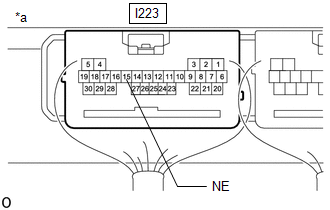Toyota Corolla Cross: Crankshaft Position Sensor "A" Signal Compare Failure (P033562)
DESCRIPTION
These DTCs are stored when the engine speed signal sent by the ECM via direct line and the engine speed signal sent via CAN communication do not match.
|
DTC No. | Detection Item |
DTC Detection Condition | Trouble Area |
Note |
|---|---|---|---|---|
| P033562 |
Crankshaft Position Sensor "A" Signal Compare Failure |
The engine speed signal sent by the ECM via direct line and the engine speed signal sent via CAN communication do not match. (1-trip detection logic*) |
| DTC Output Confirmation Operation:
|
- *: Only detected while a malfunction is present and the ignition switch is ON.
|
Vehicle Condition when Malfunction Detected |
Fail-safe Function when Malfunction Detected |
|---|---|
|
|
|
DTC No. | Data List and Active Test |
|---|---|
|
P033562 | Power Source Control
|
WIRING DIAGRAM

CAUTION / NOTICE / HINT
NOTICE:
- When using the GTS with the ignition switch off, connect the GTS to the DLC3 and turn a courtesy light switch on and off at intervals of 1.5 seconds or less until communication between the GTS and the vehicle begins. Then select the vehicle type under manual mode and enter the following menus: Body Electrical / Smart Key. While using the GTS, periodically turn a courtesy light switch on and off at intervals of 1.5 seconds or less to maintain communication between the GTS and the vehicle.
- The smart key system (for Start Function) uses the LIN communication system and CAN communication system. Inspect the communication function by following How to Proceed with Troubleshooting. Troubleshoot the smart key system (for Start Function) after confirming that the communication systems are functioning properly.
Click here
.gif)
- Before replacing the certification ECU (smart key ECU assembly), refer to registration.
Click here
.gif)
- After repair, confirm that no DTCs are output by performing "DTC Output Confirmation Operation".
PROCEDURE
|
1. | READ VALUE USING GTS (ENGINE DRIVING CONDITION (LINE), ENGINE SPEED) |
(a) Read the Data List according to the display on the GTS.
Body Electrical > Power Source Control > Data List|
Tester Display | Measurement Item |
Range | Normal Condition |
Diagnostic Note |
|---|---|---|---|---|
|
Engine Driving Condition (Line) |
Engine state | Stop or Driving |
Stop: Engine stopped Run: Engine running |
- |
|
Tester Display |
|---|
| Engine Driving Condition (Line) |
|
Tester Display | Measurement Item |
Range | Normal Condition |
Diagnostic Note |
|---|---|---|---|---|
|
Engine Speed | Engine speed |
0 to 16383.75 rpm | Fluctuates in accordance with actual engine speed |
- |
|
Tester Display |
|---|
| Engine Speed |
OK:
The GTS display changes correctly in response to the engine condition.
| OK | .gif) | GO TO SFI SYSTEM |
|
| 2. |
CHECK HARNESS AND CONNECTOR (CERTIFICATION ECU (SMART KEY ECU ASSEMBLY) - ECM) |
(a) Disconnect the I223 certification ECU (smart key ECU assembly) connector.
(b) Disconnect the A47 ECM connector.
(c) Measure the resistance according to the value(s) in the table below.
Standard Resistance:
|
Tester Connection | Condition |
Specified Condition |
|---|---|---|
|
I223-15 (NE) - A47-16 (NEO) |
Always | Below 1 Ω |
|
I223-15 (NE) or A47-16 (NEO) - Other terminals and body ground |
Always | 10 kΩ or higher |
| NG | .gif) | REPAIR OR REPLACE HARNESS OR CONNECTOR |
|
| 3. |
CHECK CERTIFICATION ECU (SMART KEY ECU ASSEMBLY) |
(a) Connect the I223 certification ECU (smart key ECU assembly) connector.
(b) Connect the A47 ECM connector.
| (c) Using an oscilloscope, check the engine speed input signal waveform at the terminal of the certification ECU (smart key ECU assembly). OK:
Result:
|
|
| OK | .gif) | REPLACE CERTIFICATION ECU (SMART KEY ECU ASSEMBLY) |
| NG | .gif) | GO TO SFI SYSTEM |

.gif)


